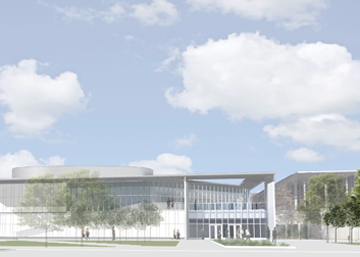Grants Support UAlbany Campus Center Expansion, Environmental Initiatives
ALBANY, N.Y. (January 28, 2014) -- The University at Albany has been awarded two environmental grants for campus projects. The first award will support environmental construction measures for its planned Campus Center expansion project, while the second grant through the New York State Association for Reduction, Reuse and Recycling, Inc. (NYSAR3), is intended to initiate a campus-wide composting project.
"Through the combined efforts of students, faculty and staff, the University at Albany has made environmental sustainability a critical component of campus planning and expansion initiatives," said UAlbany President Robert J. Jones. "These two grants showcase our innovative efforts to reduce the University’s carbon footprint while providing an engaging and sustainable environment for students."
 |
|
UAlbany is planning a major expansion and modernization of its campus center, with an expected completion date of 2016.
|
The $607,000 Campus Center grant, through New York’s Green Innovation Grant Program (GIGP), will allow the University to exceed their permit requirements and install pervious pavement, rain gardens, and a green roof as part of their Campus Center Expansion Project. The competitive Green Innovation Grant Program, part of the New York State Environmental Facilities Corporation, provides funding for statewide environmental initiatives. The program is an extension of New York's Regional Economic Development Councils and the Consolidated Funding Application (CFA), created in 2011 by Governor Andrew M. Cuomo to provide regions throughout the state with the tools to create and implement their own roadmap for economic prosperity and job creation.
The University is working on a $60 million project to expand the Campus Center by approximately 75,000 square feet, with about 48,000 square feet of related renovations to the existing building. This project, which is currently in design, is scheduled to be completed in 2016.
“The inclusion of these green practices will reduce storm-water runoff, combat heat island effect, and conserve energy, ultimately helping the Campus Center Expansion Project achieve LEED certification,” said Mary Ellen Mallia, UAlbany Director of Environmental Sustainability.
The Campus Center is the most heavily trafficked building on campus, originally constructed to serve an enrollment of 10,000 students, now serving more than 20,000 students, faculty and staff combined. It is open 19 hours a day, 7 days a week. When completed, the entire ground floor of the Campus Center will be seamlessly integrated into a renovated, bright, modern, and better functioning space. Among the planned additions include a 400-seat multi-use auditorium, a multi-use rehearsal room, market-style food service venues, a two-level fitness center, a meditation room, student group resource spaces, and miscellaneous lounges and meeting rooms.
UAlbany was among a number of New York colleges and universities receiving grants to fund innovative environmental projects as part of the first-ever College Council Grant Program conducted by NYSAR3. The university was awarded funding to purchase composting bins in order to create an office composting program that will launch during the spring of 2014.
The grant program, open to College Council members, was competitive, with applications reviewed by a committee comprised of NYSAR3 members. Projects funded had to involve initiating, improving or expanding source reduction, reuse, recycling, composting, or food waste management projects on campus. Projects also had to create awareness and interest among students, faculty, and staff, and involve an education component.
![]() For more news, subscribe to UAlbany's RSS headline feeds
For more news, subscribe to UAlbany's RSS headline feeds
A comprehensive public research university, the University at Albany-SUNY offers more than 120 undergraduate majors and minors and 125 master's, doctoral and graduate certificate programs. UAlbany is a leader among all New York State colleges and universities in such diverse fields as atmospheric and environmental sciences, business, education, public health,health sciences, criminal justice, emergency preparedness, engineering and applied sciences, informatics, public administration, social welfare and sociology, taught by an extensive roster of faculty experts. It also offers expanded academic and research opportunities for students through an affiliation with Albany Law School. With a curriculum enhanced by 600 study-abroad opportunities, UAlbany launches great careers.


